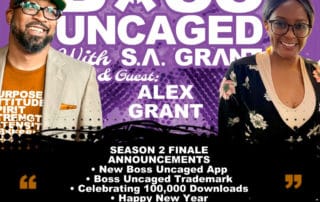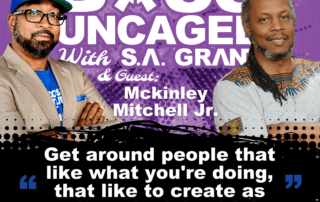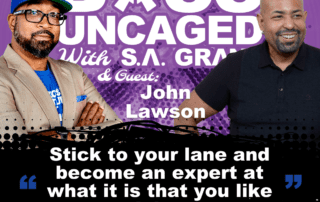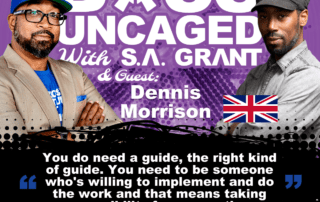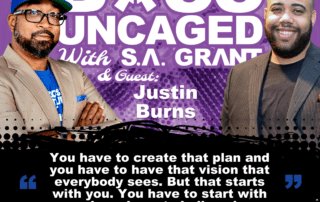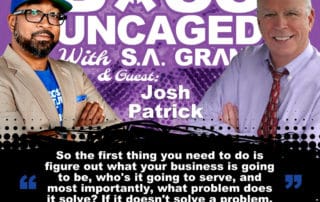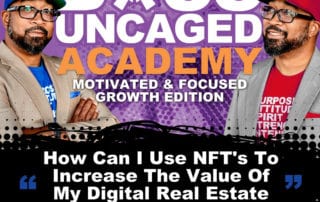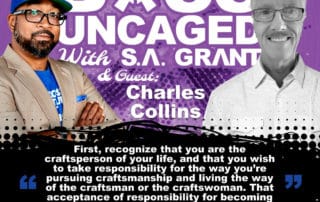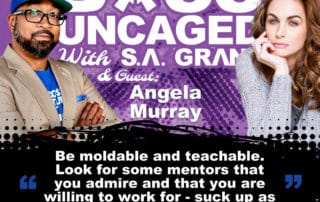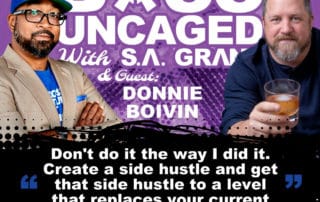Boss Uncaged Is Celebrating 100,000 Downloads and Tons Of New Announcements: S. A. Grant & Alex Grant SEASON 2 FINALE – S2E68 (#96)
Boss Uncaged Podcast Overview
- The benefits and features of the new app
- The NFT Giveaway
- His top episodes from this season
- And So Much More!!!
Boss Uncaged Podcast Transcript
S. A. Grant & Alex Grant SEASON 2 FINALE – S2E68 (#96).mp3 – powered by Happy Scribe
Boss Uncaged is a weekly podcast that releases the origin stories of business owners and entrepreneurs as they become uncaged trailblazers. In each episode, our host, S.A.Grant and guests construct narrative accounts of their collective business journeys and growth strategies, learn key success habits, and how to stay motivated through failure, all while developing a Boss Uncaged mindset. Break out of your cage and welcome our host, S.A.Grant.
Welcome back to Boss Uncaged podcast. This is episode which is really episode 96, the closing season finale of season two. Season three opener, new Year’s Day. Yay to the children. What’s going on?
Hello, Mr. Grant. How are you?
I’m doing well. So for our listeners, every once in a while you see Ms. Alex come out from the woodworks. I had to, like literally, it took like five days of negotiating. Puppies were on the table. We were talking about all these different things just to get her on this show today. Okay, so by all means, a round of applause.
Again, he won’t let me stay in the background. I said, I can just stay in the background. I can just be EP, get all the episodes ready, get people, schedule, all that great stuff, not be on camera. So, yes, it did take about a week of, okay, finally I’m in the right mood. I can’t drink. It’s 11:00 in the morning, so that would be bad. But yes, here I am celebrating the end of season two, getting ready to go into season three. This is crazy that we are number one at 96 episodes and number two actually ending the season and getting ready to go into season three, which was just something we had a conversation about. It’s like, hey, should start a podcast. But two years later, though,
they know me. Like, I like to motivate people as well too. So if you live in my house, I’m always going to push those buttons. As you can see, her beautiful background is growing, and I’m trying to morph her into any podcaster that lives with people. We’re going to try to make them into podcasts. We’re going to add Lib that so she can make it a TikTokker or YouTuber, whatever the hell she wants to call it, but eventually starting her own podcast, maybe her own.
I can do those things that our kids show me, the little ASMR, where they don’t show people’s faces. They’re just like, moving around. And I don’t know where ASMR got to Google it, but I’m just saying they don’t show face. They just show them doing something without their face on it. So that might work. Get me there.
Okay.
Mark my words, sooner or later, sooner or later, she’s going to be one of these random titles, whatever they are, because she has so much content that she just sitting on, she’s not even using it. But I progress. Back to Boston. Cage podcast. So what we got on the agenda for today?
Well, we’re going to see what Boss Uncaged has coming up for 2022. A lot of stuff, a lot of stuff we talked about before, but as this year 2021 has been very interesting, we’ve kind of streamlined some activities that we were working on. So we’ll talk a little bit about that. We’ll talk maybe about some of our favorite episodes from season two and maybe a little bit about season three and what we have coming up. Thinking about changing how we get ready to present the season. One of the first things I want to start with is you just made a post earlier today about listing notes that were moving up in the rankings. Talk about that a little bit.
Yeah. So listing notes is one of these platforms that kind of takes, I guess right now we’re about maybe 3 million active podcasters. We’re not really active, just total podcasts out there. So they kind of give you a general ranking. So this time last year, 2021, when we first started, when I was just kind of starting to pay attention to listen notes. And that’s when I really started to say, okay, let’s start scaling the podcast and start paying more attention to our downloads and just make this thing a little bit bigger than what it was a year before. So listen notes. I mean, we were at the top ten, top ten out of all podcasts, which is a great feat by itself. But once you start paying attention, I was, okay, let’s get us to the top 1%. That was my goal. I wanted to get the top 1%. So in May, we made the top 3%. And then going into the end of the quarter of 2021, we made the top 1%. And sure as hell right off that going into 2022. And I checked today, and we’re at the top .5%. So out of all the podcasts out there, out of the 3 million podcasts, we’re in the top 0.5%. It’s like the 1% of the 1%, but we’re not there yet. Where we’re getting there.
You need a little button where you can do an applause,
okay?
I don’t hear it. We got to work on that. For 2022, you can hit a button and be like, Yay. Funny you should say that, though, because I was looking back at the notes when we did our mid season recap, and we were celebrating. We had gotten to 25,000 downloads, and this was in June. So do you want a drumroll where we finished off 2021?
Yes. So I guess we could even go further back before we hit 25,000. Originally, early in the year, I did a video I did on Instagram I think I did on Facebook and YouTube, and it’s like, okay, starting of the year, we want to get to 10,000 downloads. Yay. For 2021. And then that rolled into 25,000 and we hit 50,000. And closing out the year, we crossed over 100,000 downloads for the year, which is for some people it’s epic. For some people it’s not. For us, it was just kind of like it was a landline, it was a goal and we strive for it. And we surpassed $100,000. That was my general goal when I was coming out with that $10,000. If I start now, I should be able to hit 100,000 downloads if we’re averaging 10,000 downloads plus per month. And we’re well past the 10,000 per month. So this year the goal is I’m going to push my limits. I like to aim at moving targets and heat seeking them. So let’s aim for a quarter of a million. Why the hell not?
1 million downloads.
Oh, shit. This is what she’s like. 1 million. You go from 10,000 to 10,0000 to a million. I mean, it could definitely be done. I was aiming for a quarter of a million, but a million is definitely possible. But at the bare minimum, we’re going to hit a quarter of a million downloads this year.
Okay? 1 million downloads. Remember that. Everybody going to hit a million by the time we talk again at the end of 2022. I got used to saying that. I know it just started in 2022 is going to be a lot another kind of, I would say, achievement in the email we got just the other day, which I’m really excited about. And actually before I say anything, I want to give a shout out to our wonderful, wonderful, wonderful trademark attorney led on Blackett Jones of LBJ Law. She specializes and as a matter of fact, if you go and find her on Facebook right now, maybe Instagram, you’ll see she actually made a post for her 2022 goal is that she’s going to be focusing solely on trademark and intellectual property law. And kind of what that means is really like copyrights and anything, I guess, related to intellectual property if you’re familiar with it. So she’s going to slowly be focusing on helping business owners set up their trademark. And it’s so important when you’re running a business having your trademark in place just so people can’t steal your shit. Long story short, people like, hey, I own this and I own this brand. And you’re like, no, I do. But if you’re not trademarked, then that becomes a really big fight. So I’ll let you make the announcement on where we are as far as Boss Uncaged trademark.
Yeah, so we started that early last year as well, and we went back and forth. And the trademark attorneys are always on your side. But then you have the US. Government that’s always trying to knock down your trademark saying that, well, I think it’s infringing on this space and it’s touching on that. And I’m like, dude, there’s not another Boston cage like Boston cage right now. Like, stop trying to blur the damn line. So finally, after damn near eleven months, we finally got the approval letter from the US. Government saying that trademark is pretty much going to push through, is going to get approved. So I just want to get my certificate. Once I get a certificate, I’ll put it up there like the Serebral360 on the background.
You put another certificate up on your mantle.
Serebral360 Boss Uncaged trademark. Touch it and I’ll burn you to living hell.
Send it to letters going forward. Now, speaking of your background, I see Mr. Manhattan. Okay, so let me tell the story about Mr. Manhattan quickly. It’s a little off topic, but I’ve known probably close to four years now, maybe a little bit more, a little bit less, but close to four years now. And we’ve talked about that pop that he has in his hand right now, mr. Manhattan forever. So every time we go to any store that sells those, we were looking for Mr. Manhattan. Now, our daughter is very internet savvy. She’s been looking online, and they were ranging from the price range of like $300 up to like $800. And, you know, both of us, we’re not spending that much on a tour. I’m sorry. It is what it is. So she actually came to me before Christmas, and she said, I know exactly what I’m going to get Shannon for Christmas. I was like, okay, what is that going to be? And then she showed me, and I was like, and it was a really great price. I want to tell you what the price is, but it was less than the $300 that we were willing to ever pay for actually less than $100. So surprising. And so on Christmas morning, we were all like, you are going to get the biggest gift, not size wise, but most impactful, just because for the last four years, we have looked at every store for this pop character, and now he finally has it. Mr. Manhattan exists among your menagerie of things that are behind you.
Mr. Manhattan. The golden pieces. Just kind of like if you know anything about comic books in general, obviously there’s Star Wars, there’s Marvel, there’s DC. I’m more of a Marvel guy, but when it comes to DC. Mr. Manhattan is the guy that just does it for me and his historian, his legacy of just what he is. And it’s kind of like, kind of goes back to my cerebral through 60 days. And I think he’s just the epitome of everything that cerebral through 60 represented and what I wanted it to become. So, Mr. Manhattan, welcome to the club.
You sitting back there over your shoulder, more things to come behind you in your backdrop. All right, so let’s switch gears a little bit and talk about I know at the end of last year, or maybe even we did talk about it in the mid season recap, but the app, how is the app going? Give us a little bit more information on that.
Yeah, so finally I know, I brought it up last year, and literally I’ve been working on it behind the scenes amongst everything else that we had going on. And I’ve just been layering it and layering it and documenting it and building this Excel spreadsheet to kind of keep it organized because it went from this simple app to where it’s a simple representation of Boston Cage, which is two different things. Right? A simple app would have been one functionality. This app pretty much becomes kind of like the whole metaverse, but it’s the meta verse of Boss Uncaged. It’s everything that’s Boss Uncaged into one app. So if you’re in Boss Uncaged Academy and you want learning and you want more information, that’s there. If you want Boss Uncaged podcast, that’s there. Boss Uncaged Book Club. That’s their essay. Grant and my books, all that’s there as well. And then we’re moving into some new things that you’re going to bring up that’s also in this app. And then again, as I grow and build these different platforms, they’re all going to be integrated into this one platform.
It’s really cool. Where is it at? Where can we find it?
What stage is it at?
Stage wise? Right now, the beta version of the app is complete. So right now we’re just waiting for the Android Store, the Google Store, to give us approval so we can launch it on there. Hopefully, I can get that launched the next week. And everyone that knows about Apple then knows that Apple is a pain. So we’re going through the Apple phase right now. So the Android will come out first, and Apple will come out shortly thereafter once Apple approves it. So Android processes ten times easier and cheaper. And then Apple, obviously, it’s like pulling teeth to kind of get things approved in Apple.
Apple apple is superior, so it just takes a little extra work. I don’t even understand this Android world. What is this? What is this for?
Android is called open source. But.
I’m excited about that. So the app will be out, hopefully very soon. So look out for more information on that. Maybe we’ll do a boss up episode about the app, kind of show people how to go through it, where to get it, what benefits it has. So that would be cool.
Yeah. I’m actually like, out of all the things that we got going on, that’s one of my best things that I think that’s going to be very useful. Because, again, some podcasters, they’ll create things, right? Some posters may do YouTube channels. But when I think about the analytical data and information behind the scenes. The best way for you to capture. Like. What’s going on on YouTube. What’s going on here. What’s going on here. Or somebody finds you on YouTube but they don’t know where you are on podcasting. Or they don’t know where you are on Facebook. Or they don’t know you have a book club. By promoting the app and putting all my marketing efforts into that strategy, then by default, everything will have access into one platform and then I can check that data as well.
All right, makes sense. So let’s talk a little bit about some of the episodes from season two. The second half, we talked a little bit at our mid year recap, but for the second half of season two, you had some really great interviews. And one of the ones that I wanted to bring up, because it is the platform that we host on is BCAST. You interviewed the founder of BCAST, Tom Hunt, I believe his last name was right after midseason, so it was around June or July. If you want to scroll back through and find that episode, or you can just search for founder BCAST and it’ll be there. BCAST has been a really great platform, very user friendly for this non technical person. And they just came out with a really good feature which helps us get ready to highlight some of our sponsorships, which you may talk about later.
So Tom is one of those things. It’s kind of like every entrepreneur, there’s different levels of entrepreneurs, right? So, like, you’re here and someone else is here. And then I looked up time every time. This is part of what we’re going to talk about as far as the tech club, but every time I find an application or find software, the first thing I usually do is figure out how to use it, how do I keep the cost down, and then who is the inventor of that product? So Tom and I looked him up and he did a bunch of different talks and he had YouTube content and he had all the different information out there and he did multiple different things before he created BCAST. I was like, what the hell do I have to lose? This was like, probably maybe January of 2021, maybe December last year when I reached out to them. And then I was just kind of like, do I use your platform? This is what I love about the platform. I would love to interview you on your own damn platform. And he said, yeah. And then we just kind of got to this conversation and we talked about like, AppSumo. We talked about his lifetime deal and what he would bring to the table and why he used that platform. So it was a really in depth conversation about startups and like, what startup owners and startup developers are really thinking about. But to your other point about the features, the reason why I love this platform, because I’m always thinking ahead and I’m always thinking about marketing strategies. I’m always okay, eventually Boston Cage is going to have sponsors. Eventually Boston Cage is going to have this. But I need a platform to be able to support it before it even happens or at least have a road map that’s going to that direction. And it brings us to the point that you were just talking about the features of this platform and one of the best features that I’ve seen as far as hosting platforms is inserts. And with inserts are imagine having a podcast and you don’t have to essentially edit in your ad spots or edit in your intro, edit in your outro. Only thing you have to do is record your intro, record your ad spot, record your outro and then log into your platform and say, hey, I want this to go before my podcast starts. I want this to be interjected in the middle of my podcast and I want this to close out my podcast. By the way, I want you to do it on all my episodes. Hit submit.
Yeah, exactly.
And it’s done. That’s what sold me on this platform in addition to other features.
That is really cool. It was really exciting to see that come up as actually working through editing a podcast and I was like. I think we got the feature that you’ve been begging for like a year. Which was perfect timing because we’ve had some recent companies reach out to us for sponsorships and it was always one of those things we kind of held back on a little bit just because we could insert ad spots. But it’s just so difficult to edit it in as I’m learning Adobe Audition right now. So this makes it a whole lot easier where we can just record the ad spot, click a button and add it into the episodes or run it for whatever number of weeks that we need to run it to in order to fulfill the sponsorship agreement. So look forward to that in 2022. You may get a couple of commercials. That’d be exciting. It won’t be my voice. I want to put that out there to be your voice.
My voice. Well, I mean, obviously it’s a two for one, right? I mean, you’re the voice of Boss Uncaged, right? So I think the sponsorship is a cool thing. I mean, you’re always thinking about like I always get the random question about how you’re doing this podcast, how the hell do you monetize it? And I was like, there’s a million different ways of monetizing it and obviously ads is like the low hanging fruit of classic radio of monetizing. And then you had a radio spot. But the first two years we didn’t do any ads spots except for essentially our own and we really didn’t even promote our own stuff. But now that we have access to this system and to our point, I was asking for a year, our outro and intro right now are pre recorded and I was like, dude, I can’t wait until we get the middle spot. Because the middle spot is kind of like the conversion point. If anyone is listening to a podcast up until the middle, then they’re going to probably listen all the way to the end. So they’re engaged at that point. So we need to have access to that add on feature. So once it’s released, I was just like, dude, it’s about to be a game changer. And to your point, in the past 30 days we’ve gotten some sponsors that would cost them. Okay, hey, we looked you up. We see that you have the downloads we’re looking for. We looked you up. We’re seeing that you’re in the top I think it was top 1% of listen notes at the time. And they were like, well, this is the only thing you have to do. We want you to promote. And then again, I’m going to be reviewing this content as it comes in to make sure that it’s valuable to our listeners. I’m not just going to promote random hair shampoos, right? I’m going to be promoting 100% what’s? Business related business strategy stuff, software, things that can help business owners get ahead. So that’s like the next phase of what we’re going to be doing. So to your point, we’re definitely going to I’m pretty much going to sign off on this contract and then start doing this promotion pretty soon. So listen out for the new ads coming out.
Another really great episode from this season that you talk about all the time is Jacqueline WellWells’ss The Fear of the Spa.
She hit me in my heart because it’s a transitional point for my mom. I see her and she’s probably like 15 years older than my mom, and she’s completely fearless. Like this woman. Her story was crazy, talking about raising her kids in Europe, and she would just put them on the bus and tell them to go to this address. And they were like six, seven years old. It was like, what versus? Like, my mom. I always make fun of her and say, you’re paranoid schizophrenic. But I was like, mom, you have to listen to this episode. Like, this woman is where you can be if you just remove the fear from your life and start embracing the what if? Like the positive what if. So that’s why I always bring up the episode, because she kind of reminds me of where my mom could be. And she’s starting to get there. I mean, like, we got her an Apple Watch for Christmas. So she’s moving through technology a little bit and starting to embrace it. We just got her a Facebook account. I was like, holy shit, she’s making comments on Facebook?
And then did she make a post or something?
Yeah, she made a post. I was just like, dude, so a little bit of a time. Eventually, by the time she hit 70, she’s probably going to be like this Internet monster. But the goal is to remove the fear and step into the world that you live in, right?
True. Okay, so change a little bit. One of my favorite episodes was you and donny. Donny is the head of Success Champion Networks, is a friend of yours. You spoke at the Success Champion Network Conference this past September, I think it was. So yes. Donny’s episode, if you have time, go back and check that one out. It’s explicit. So maybe not with kids in the car or if your kids here, you cuss, whatever. But talk about Donny’s episode.
Donny, it’s a great thing with what podcasting can essentially do for you. Donny originally had found me through his system. His system out there was just looking for people to get on podcast, right? So I was doing my job, his people were doing their job. Then he came on the show and they were promoting a new podcast. So him and Kevin came on the show, right? So they ended up recording two separate episodes. And just meeting Kevin and meeting Donny was just kind of like, both of them are me. If I was to combine myself like, Donny, I don’t care. This is the shit I’m going to do. I wake up on a Tuesday with a random idea, I’m going to execute it. And Kevin is a complete systems automation guy. And my left brain and right brain speaks to both of them equal, just becoming part of their networking, their Success Champions networking group was also very beneficial as well. You’re going to start seeing some new episodes coming from that group of people that are 100% entrepreneurs, business owners. So just getting into Donny’s world kind of just opened up another spectrum, another page of boss and Cage and a lot of duality between what we do and who.
Totally makes sense and kind of, as you said, looking forward to season three. We have a lot of great episodes. I think you’ve recorded pretty much the entire year already. I know we have just to give you a snippet, I’ll just go by the boss names just to give you a little bit of a teaser. You got the giving boss and the venture capitalist boss. That will be really good. We have the talent boss, the productivity boss, the confidence boss, which is good for someone who is lacking confidence. That will be a great episode to listen to. So stay tuned for a dynamic season three. We can talk a little bit about how we may change and do season three and season four in 2022, but we want to hear your feedback about it. Were you good with having an episode come out per week and then we did all of season two in 2021? Or would you like season three and season four in 2022? So your feedback and your comments are always greatly appreciated because we want to know, what do you all like?
Yeah, I mean, with that, I mean, we’re on episode 96 approaching episode 100, which I think that episode deserves us to kind of do. Come back on here and talk about it again because originally first season, I was worried about having enough people to interview. All right, right. The second season, I don’t know what the hell I was smoking or somebody gave me a blue pill or whatever. And I was like, we’re going to record five episodes a day for every single day we’re going to go into well into season four. And I was on that shit earlier in 2020, obviously, but it paid off, right. So now that I’m looking back at it like we’re about to release episode 100. But to your point, we’re backlog up until probably episode 200. At this point, we have enough content to really essentially going back to your formatting of splitting up the episodes. Biannually right. So if we do season three up until June and season four from June to July to kind of make it into smaller bites because this last season was 60 something episodes, that’s just a lot of damn episodes to kind of swallow. So what would that look like? Look back at maybe 30 episodes, 35 episodes, which is a little bit more than season one, but it’s not as big as season two. But to your point, we have enough episodes to roll into season four. Season five, we decide to split that way and then we still have more people that are reaching out. This morning I was in the supermarket and I got two emails while I’m in supermarket saying, hey, we are promoting podcasters and blah, blah, blah, blah, blah. We’re marketing company. And we realize that just to look for more people interview, we have two or three people that would be great for your show. So keep in mind we have enough content. But the goal is not to just put out any content. I want these people, when I interview them, it’s like they’re interviewing me at the same time. And the synergy is there and the information and the data that you’ve grown to love and growing that we’ve provided for the past two years to be even more fruitful going into the years three, four, five and six.
Right. Well, like I said, get ready for season three. I forgot to add we’ll have our first CBD company coming up, hopefully in the next couple of weeks. That is going to be a really great interview that you also listen to. If anyone has any questions on how the CBD industry works, that is episode that you want to check out. So you have all of these episodes. The irony of it is people always ask, how do you have time to do all of this? Plus your new venture that we’re going to talk about, your NFTs, what is it called? Boss Uncaged Beast. Tell us about your NFT project.
It only makes sense, right? I mean, coming from a design background. And I’m thinking about growing up as a kid with a marker in my hand or a black book. And back then it was. Kind of like broke ass artist that was just sketching. And then you would take it to graffiti and you were writing on stuff. And then Mark Echo took it to a whole another level. And I was just like, dude, this is our time, right? So what am I going to do to kind of add into the space? Because this is one of those bandwagons that I’m not willing to miss, right? Other bandwagon. Just this one. No. So The Beast, it just kind of goes back to being on Cage. The first book that I created was the first new book when I rebranded, was kind of a line on the cover. And I was like, and most people don’t know. Behind the scenes, I have these Excel spreadsheets. And in this Excel spreadsheet, I had variations of different cover ideas, different concepts. The line was the first one. Then it was supposed to be a dragon and a panda. All these different animals that we live with today that are considered like beast. If you really want to get in front of them, they probably shred you, tear you up, right, and spit you out. So I was like, how could I do this and then convert this into an NFT? And those that don’t know NFT, I would definitely go to YouTube and look up my NFT video. And I really broke that down simplistic as possible without getting into crypto, but just understanding how to utilize NFPs. So I decided to say, okay, you know what? I’m going to create an illustration of a lion, and I’m going to do variables of it. And I’m going to release my first collection. And you know me, I’m boss to the wall. So I’m going to go with 10,000 NFT. It’s my first collection, and I know people are like, how the hell? What the hell? Don’t worry about what the hell. Just look out for what I’m going to also going to do is I’m going to give away 100 NFT’s right off bat. So once I do the promo release, which is coming very soon, because behind the scenes, I’m building infrastructure for this because again, I’m an automation guy. But once I say, hey, it’s time for release, and whoever signs up and subscribes or whatever, I’m going to give the first 100 entities of that 10,000 away for free for our listeners.
So you have the opportunity to own your first Boss Uncaged or the first 100 Boss Uncaged NFT’s just before everyone else, and they actually go out to sell. So that would be really cool. For anybody who doesn’t know about NFT, there’s 500 million videos on the topic. I suggest you go out there and listen to it. I’m sure we’ll have an NFT episode once that’s released to talk a little bit about what’s the value of owning an NF t. I had to do a little research myself so I can say I’m in middle school of NFT lesson lessons. I understand what it means. I understand the value of it. Do I have any right now? Soon maybe? I have a boss on casual. But yes, look for that promo to come out. I guess in the next couple of weeks, maybe next couple of months, we’ll definitely do an episode on it. Like I say, he’ll do a giveaway. We’re going to have the first 100 NFTs giving away. So be on the lookout for that. So you can get one of those for free.
You switch up to the next topic. The other thing about NFT is that people don’t realize it’s kind of like looking at as a digital certificate, right? It’s a digital receipt. So imagine having a receipt that has access codes, right. So, prime example, if I decided to give 150s, maybe I’m not saying maybe not, but maybe those 100 NFT will also come with a 60 day free trial or a 30 day free trial to the Boston Cage Academy. Or maybe it’ll come with an exclusive secondary club on Facebook. These are the things that you can add on to expand your value add. But then people could have ownership. And ownership then comes with collecting. And collecting comes with bragging. Right. And I always say you want to think of it like if I could go back in time and I could own the first Super Bowl ticket, the first one ever. And that Super Bowl ticket then gives me access to have 50% off of all Super Bowl tickets ever moving forward, just because I own that first NFT. That’s a hell of a value add to make sure that first NFT was purchased.
Yeah, no, totally get it. So I’m glad you brought that up, Boss Uncaged Academy, what’s going on with the Academy?
Yeah, again, everything that I’m doing is essentially built upon like legacy building and building our structures. And I look at it as Legos, like this one roll Legos, another layer of Lego. And I’m building up this foundation. So the Academy came into play last year and we did like a beta test. I did like a soft test for founders. But now going into 2022, a lot of the infrastructure is ready built. We have hell of content in there. And that was the beautiful thing about joining the Success Champions. This gave me opportunity as the Education Chair to build out content weekly. And in addition to that, like, test that content, get live feedback. So now that we have so much content about digital marketing, strategy, brand building, podcasting, all my books are all inclusive inside of this environment. So that’s the new thing that’s going to be going forward. I’m going to start doing more marketing, more promotion. You can start seeing more content, more videos for that. Again, we have people already in the Academy that’s been in there for like the past six months. But now it’s time for us to really market and grow that. I mean, I want to get that environment to where we could have 1000, 10,000 different individuals that are section based upon they love podcasting or they love branding or they love marketing and be able to go to this environment and get access to me, get access to other people, get access to the content to help them move on the right path. But the beautiful part of the Academy, the add on that’s the next thing you’re going to allude to is a tech club. And that’s a core feature to the Academy as well.
Go a little bit more into the tech club now. I was going to bring that up next.
Yeah. So, like, the book club, as I was asking these questions on the podcast, if you guys are obviously pattern oriented, right? So everyone asks these different books. And then the other section was, what apps do you use? What software are you using that you would not be able to do what you’re doing without having access to this platform? And then as I started growing the Academy, I started realizing that people had lots of questions about, well, I need to be able to do this. I don’t know what software to use. And for me, I plug into software like, I’m Neo and the damn Matrix. I’m plugged into shit. 24/7 So I’m buying stuff and I’m using stuff, and I’m really big into lifetime deals. And I was like, okay, this is helpful for the Academy, for me to do one on one tutorials to say, okay, step by step, this is how you set it up. Step by step, this is how you build this environment, and this is the benefits of this environment. But then outside that, I was like, what’s the free to play version? Right? I was like, Well, I could just take this content, take a 32nd video, tell people, like, the features of it, tell people the benefit of it, and tell people also, like, what is it being used for? And then people that are listening to Boss Uncaged will have access to a complete database of all the software that we’re using to build Boss Uncaged. You can see it in live action, and then you also can see it live on the Academy. And then there’s other people that are starting to use and purchase this software as well that can also give you feedback in that environment.
That sounds really cool because it is true. It’s something that someone’s always asking you like, hey, how do you do this? Hey, what software do you use? It’s one of the questions that’s in the podcast itself. What tools help you do what you’re able to do? And sometimes that’s physical tools. Sometimes it’s the software. So it’s good to have like, a techie club. What about my book club, folks? I’m a book club girl. What’s going on with book club?
So the book club is ever expanding. Right? So, I mean, closing out the last year, I think we just kind of slowed down and again we’re going to ramp back up. Right. So first year we did 52 books. So this year I think we’re going to close out somewhere. I forgot what the team was at. They were sending me updates last week. So we’re at like 200 something books or whatever. So the goal for the book club essentially kind of goes hand in hand with the tech club, right. If we’re interviewing more and more people and more and more people are telling us, hey, these are the books that help them get on there, help them to get to where they are currently, then these books need to be in the book club. So again, we’re not necessarily going to be promoting the books per se in a book club, but we’re going to say, hey, if you want access to a real estate book, go to the Boss Uncaged Book Club directory, click on the Search in Search button and select Real Estate. And it is all the books that real estate people that we’ve interviewed have promoted or marketed, and this is why. And then we’re going to link that back to the Boston Cage episode. So then you can kind of hear, why did they like that particular book? What did that book do for them? And then obviously from there you could easily go to Amazon and purchase a book if you want to. So we’re moving the book club more so from a typical book club where we’re reading and communicating, which we’re still going to be doing, but then giving you more access to a database to say, okay, I’m just looking for a particular type of book, and we’re going to go from 200 to eventually 2000 to 10,000, and the book club is forever going to keep growing.
That’s cool. Yeah. So kind of my last question is, what about your books? What about more books from SA Grant, the Boss, in case Boss UncagedTrailblazers? What are you doing this year or for 2022?
Yeah, so I took a hiatus from books last year just for the last 90 days of 2021. I have so many books that are in development or at 90% complete. And I was like, okay, well, before I release any books, let me start focusing more so on this app because the app is going to feed the books through the app. Let me focus a little bit more on the podcast to kind of figure out what we’re going to do as far as Monetizing. And now we have the ads. So now that these things are in place, the next step for me is more so, not general books, they’re going to be more specialized books. So going into next year, I think one of my first books, it could be the Boston Cage book, that we’re at 98% with that book and we’ve been sitting on that book forever.
It’s right there.
It’s right there. And then in addition to that, my first book that kind of goes to my heart when I talk about branding. So I’m going to probably take all this collective data that I’ve been creating and content and speaking about on stage and collaboratively put all this information into like a Boston Cage branding book, like a one on one branding book. And that’s going to be like a whole another collection of books. But after that, it’ll be the Boss Uncaged Podcast, right? And then obviously we still have the notebooks as well. And that’s something I could easily turn on and produce the rest of that collection tomorrow. But the goal is marketing behind it. So like the why am I doing it? So like, the next book in that line, I just have to debate on which one is going to be volume two. And I already kind of have that pre organized and prestated. So to clearly answer your question, the next four books from Boss Uncaged from SA Grant is going to be a branding book, a podcast book. I’m going to continue creating the notebook series. And then obviously I think we need to make an announcement about it.
But last year we did the notebook series. That was kind of an add on to the I’m trying to remember what was the other one. I got it right here behind me, people.
I know, I was like, grab. One of them is right behind you. The notebook on your other site.
Yeah, here they are. So originally we created the journaling series. Those that remember this is one of many journals to come. And again, I could turn these out pretty quickly and go on. So there’s going to be another volume of this coming out this year, at least one more volume. And then now that Amazon people that know about Amazon and know about KDP, now I could turn these notebooks into hardcover notebooks. So I decided to kind of create these generalized notebooks just to allow people to take notes and obviously marketing and just build a boss in case ethosphere, right? So now the next step of this is converting a lot of the books that I originally had into hardcover books, not as a feature set to actually have and produce that content.
Well, I love that idea. I mean, you know how much of a notebook junkie I am. And when you created that series and do you have it, can you show it again where it’s like the three different versions? Like if you like dot journaling or if you like the grid journal, if you just like blank pages, there is a notebook that essentially aligns with your likes. Like I said, I’m a junkie. I have notebooks all over this that literally will have like one word written on one page because I’ll fill it and I’ll touch it and I don’t like this. So it was kind of great that you created a notebook for each type of individual. The people who like grids, people who like dots, people who like blank pages in addition to the book journal. And then I’m looking forward to the podcast journal. So if you’re listening to podcasts, it gives you an opportunity to take notes while you go and have something to reference back to. And all of that will be more of that will be coming in 2022. Now that we have time for that.
It’Ll be in the app as well. You just go into SA Grant books and it will be all the books that I’ve ever created will automatically list it in there.
Definitely. Well, I think I’ve touched on everything that we have that I know of. Coming up in 2022. Do you have any other surprises for us before we wrap up?
No. I mean, obviously for us as the creators and developers, it sounds like a lot, and for me, this is just all part of my master plan. Again, anyone that has known me from my cerebral through 60 days is like taking that formula and now branding that formula and making it not more so about me, but more so about the bosses out there. So every single thing that I’m creating is essentially a tool for someone. If it’s a notebook, great. If it’s a journal, great. If it’s the podcast, great. If it’s a book club, great. If it’s Tech Club again, we keep layering on these Legos because the goal here is to give access to individuals that just need a little bit more. They just need a little hand holding that needs a little bit of information or insight or to see someone actually building a company that didn’t exist two years ago that was not even in existence. This podcast is essentially coming up on the second anniversary and where we were day one to where we are right now. I mean, we’re celebrating 100,000 download, which is day one. I didn’t even think that was even an option. Right? We’re talking about 100 episodes. Day one. I didn’t think that was an option. Book club. Tech club academy. All that shit was not an option. The only thing I was focusing on day one was let’s just create a podcast post stroke and just start branding Essay Grant and see where it goes. And this is where you’ve been on the journey with us since day one. If you’re new to the journey, all this content is out there. You can go to our YouTube channel, you can go to our podcast and just go back to day one and kind of see how we went from there to where we are right now.
Sounds cool. I’m excited. 2022. One of the young children saying eat.
Truck. Yes. It’s so funny. Caitlin again with her yeeeeee. This.
I think I’m pronouncing it too well. I pronounce the t at the end, which I don’t think what I’m supposed to do.
But you can’t show your age, man. You can’t show your age. I definitely appreciate everyone. Again, I just want to say a heartfelt thank you to all our listeners that got us to where we are. And the goal is again, we are continuing to create new content and new information and new tools for you. So by all means, reach out. Let me know if something was helpful, if there’s anything that you would like to see, other additions add ons. Again, we’re in the digital space, so turning on the switch is like a light switch really is kind of like using to figure out how to do it and why we’re doing it and if we’re going to get most benefits to our listeners from doing it as well. So with that, again, closing out 2021 and opening up 2022 again, this is season two, episode six, which is episode 96,
right?
Next time you hear from us, it will be season three, episode one, which is coming very quickly. So, again, essay Grant, I appreciate you guys. Over and out. Thank you.
Thanks for tuning into another episode of Boss Uncaged. I hope you got some helpful insight and clarity to the diverse approach on your journey to becoming an engaged short place. Don’t forget to subscribe, rate, review and share the podcast. If this podcast has helped you or you have any additional questions, reach out and let me know. Email me at SAGrant.com or drop me your thoughts via call or text at 76223. Three boss. That’s 762-233-2677. I would love to hear from you. Remember, to become a Boston Cage, you have to release your inner beast. SA Grant signing off.
Listeners of Boston Cage are invited to download a free copy of our host SA Granton site for ebook. Become an Uncaged trailblazer. Learn how to release your primal success in 15 minutes a day. Download now at www dot. Bossuncaged. Comfreebook. Bye.

